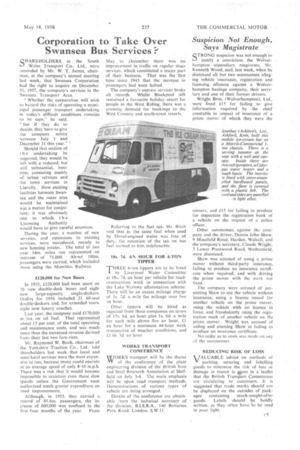Corporation to Take• Over Swansea Bus Services ?
Page 45

If you've noticed an error in this article please click here to report it so we can fix it.
SHAREHOLDERS in the South Wales Transport Co., Ltd., were reminded by Mr. W. T. James, chairman, at the company's annual meeting last week, that Swansea Corporation had the right to acquire on December 31, 1957, the company's services in the Swansea Transport Area.
"Whether the corporation will wish to hazard the risks of operating a municipal passenger transport undertaking in today's difficult conditions remains to be seen," he said. " but if they do so decide. they have to give the company notice between July 1 and December 31 this year."
• Should that section of t h e undertaking be acquired, they would be left with a reduced, but still substantial, business, consisting mainly of urban services and the town services in Llanelly. 1-low existing facilities between Swansea and the outer area would be maintained was a matter for conjecture; it was obviously one to which the
Licensing Authority would have to give careful attention.
During the year, a number of new services, and extensions to existing services, were introduced, mainlynew housing estates. The total of ust over 14m. miles run represented an increase of 71,000. About 100m. passengers were carried, which included those using the Mumbles Railway.
£120,000 for New Buses In 1955, £120,000 had been spent on 20 new double-deck buses and eight new large-capacity single-deckers. Orders for 1956 included 21 60-seat double-deckers and, for extended tours. eight new luxury coaches.
Last year, the company paid £170,000 in tax on oil fuel. That represented about 13 per cent, of the total operating and maintenance costs, and was much more than the increased revenue derived from their last two fare-rises.
Mr. Raymond W. Birch, chairman of the Yorkshire Traction Co., Ltd.. told shareholders last week that local and semi-local services were the most expensive to run, because many could operate at an average speed of only 8-10 m.p.h. There was a risk that it would become impossible to maintain even those slow speeds unless the Government soon authorized much greater expenditure on road improvements.
Although. in 1955, they carried a record of 81.6m. passengers, the increase of 600,000 was confined to the first four months of the year. From May to December there was no improvement in traffic on regular stage services, which constituted a major part of their business. That was the first time since 1943 that the increase in passengers had been halted.
The company's express services broke all records. Whilst Blackpool still remained a favourite holiday resort for people in the West Riding, there was a growing demand for bookings to the West Country and south-coast resorts.
Referring to the fuel tax, Mr. Birch said that as the same fuel when used by Diesel-engined trains was free of duty, the retention of the tax on bus fuel seemed to him indefensible.
18s. 7d, AN HOUR FOR 6-TON TIPPER
THREE 6-ton tippers are to be hired I by Liverpool Water Committee at I8s. 7d. an hour per vehicle for roadconstruction work in connection with the Lake Vyrnwy afforestation scheme There will be an excess mileage charge of Is. 2d. a mile for mileage over five an hour.
Other tippers will be hired as required from three companies on terms of 17s. 6d. an hour plus 1 s. 6d. a mile for each mile above five an hour, 11 an hour for a minimum 44-hour week irrespective of weather conditions, and 11 Os. 3d. an hour.
WORKS TRANSPORT CONFERENCE WORKS transport will be the theme VV of the conference of the plant engineering division of the British Iron and Steel Research Association at Sheffield on July 3-4. The main emphasis will be upon road transport methods. Demonstrations of various types of vehicle arc being arranged.
Details of the conference are obtainable from the technical secretary of the division, B.I.S.R.A., 140 Battersea Park Road. London, S.W.11.
Suspicion Not Enough, Says Magistrate
STRONG suspicion was not enough to justify a conviction, the Wolverhampton stipendiary .magistrate, Mr. Kenneth Wood, said, last week, when he dismissed all but two summonses alleging vehicle. insurance, registration and licensing offences against a Wolverhampton haulage company, their secretary and one of their former drivers.
Wright Bros. (Wolverhampton), Ltd., were fined £.15 for failing to give information required by the chief constable in respect of insurance of a prime mover of which they were the
oWners, and 115 for failing to produce for inspection the registration book of a vehicle on the request of a police officer.
Other summonses against the cornpany and the driver; Dennis John Shaw, 9 Masefield Road, Harden, Walsall, and the company's secretary, Claude Wright, 3 Lower Prestwood Road, Wednesfield, were dismissed.
Shaw was accused of using a prime mover without third-party insurance, failing to produce an insurance certificate when required, and with driving the prime mover with the mark not fixed.
The company were accused of permitting Shaw to use the vehicle without insurance, using a licence issued for another vehicle on the prime mover, using the vehicle with no licence in force, and fraudulently using the registration mark of another vehicle on the prime mover. Wright was accused of aiding and abetting Shaw in failing to produce an insurance certificate.
No order as to costs was made on any of the summonses.
REDUCING RISK OF LOSS VALUABLE advice on methods of V packing, securing and labelling goods to minimize the risk of loss or damage in transit is siven in a leaflet that the British Transport Commission are circulating to customers. It is suggested that trade marks should not be displayed on the outsides of pack ages • containing much-sought-after goods. Labels should he boldly written, as they often have to be read in poor light.
















































































































